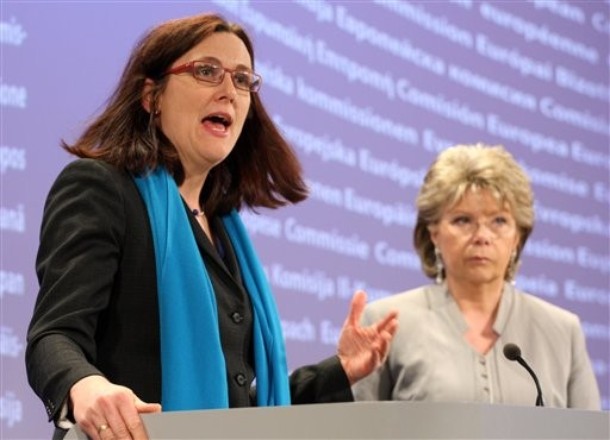
This week brings a critical test for the transatlantic security partnership. The European Parliament will vote on a revised agreement with the United States on tracking terrorist finances using financial data unique to the Belgium-based Society for Worldwide Interbank Financial Telecommunication (SWIFT). The vote is about more than restoring data-sharing. It is about whether Europe will remain a strong partner in protecting the transatlantic community.
The vote comes five months after the European Parliament blocked U.S. access to the data, which had been shared as part of the Terrorist Financing Tracking Program (TFTP). Established shortly after September 11, 2001, TFTP was developed in cooperation with SWIFT and in accordance with long-established U.S. law to uncover terrorist money flows and disrupt plots.
Money trails don’t lie. SWIFT’s financial data has helped uncover terrorist networks and plots around the world. Its successes include helping capture al Qaida’s leader in Southeast Asia, Hambali and aiding in the investigation of al Qaida’s August 2006 effort to blow up multiple flights from the United Kingdom to North America; the Islamic Jihad Union’s planned attacks in Germany; and the 2008 arrest of Barcelona-based terrorism suspects before they fanned out across Europe. More than 1500 leads have been provided to European governments to support their terrorism investigations. The program has saved lives – European, American, Asian and others.
Initially, this U.S.-European cooperation was kept secret to avoid tipping off terrorists to our methods. But in 2006 – amid the unpopularity in Europe of President George W. Bush, the war in Iraq, and Guantanamo – the program was revealed. The news that Americans were accessing European financial data caused a public outcry and demands for privacy protection.
Although motivated by legitimate concerns over past abuse of personal data by governments, the civil liberties challenges to this program were misdirected from the outset. TFTP was designed with civil liberties protections firmly in mind.
As SWIFT has noted, its compliance with U.S. Treasury subpoenas was “legal, limited, targeted, protected, audited, and overseen.” The European Commission’s investigator, French magistrate Jean-Louis Bruiguiere, found that strict safeguards and limited access to terrorist-financing data were vigilantly respected. Even the New York Times acknowledged publicly that the paper was wrong to have revealed the program with no signs of illegality or abuse in its operation.
But in February 2010, the European Parliament – asserting its newly acquired Lisbon Treaty powers – argued that the agreement negotiated by the European Commission was inadequate. Its decision put a stop to the transfer of financial data to America. And because Europeans themselves do not subpoena such data, the world has been largely blind to terrorist financial transactions that may be traversing Europe.
Now the Parliament has a second chance. If it approves the new US-EU Agreement signed on June 28, data could again be accessed as early as August 1.
This is a potentially happy ending. But the story is nonetheless troubling because of what it reveals about European thinking concerning the United States and terrorism.
Unanswered Questions
First is the European assumption that the U.S. is a rogue. This is not just about European dislike for former President Bush: it was President Obama who sought continued cooperation with Europe, and was rebuffed by the Parliament. There remains an underlying lack of understanding and trust in the U.S. role in combating terrorism.
Second is the European willingness to block access to data while negotiations continued. This suggests a lack of understanding about the value of this financial information to counterterrorism efforts and perhaps a willful disregard for the privacy safeguards already in place. It also raises legitimate questions about whether some in Europe see the terrorist threat as less menacing (despite attacks in London, Madrid, and thwarted attacks elsewhere) and place a priority dogmatically on protecting data at the expense of protecting lives.
Taken together, these observations raise a larger question about Europe’s willingness to play its part in protecting our shared transatlantic community in the post-9/11 world. The United States and Europe remain a single, democratic community of nations. We cherish the same values – freedom democracy, rule of law, human rights, and economic opportunity. We face the same challenges in a world marked by authoritarian regimes, extremist and criminal networks, failing states, and regional crises. We can only confront these challenges successfully if we confront them together.
How the Parliament votes this week on SWIFT is therefore about much more than data-sharing. It will be an indicator of whether the United States can have confidence in Europe as a partner in addressing the security challenges of the 21st century.
And none too soon: The Parliament has begun reviewing a second US-EU agreement: on sharing name records for travelers to the United States. In view of the December 25th failed airline attack in Detroit, and a congressional requirement for advance name-records, an effort to reshape this agreement could raise even greater questions in the United States about Europe’s commitment to the transatlantic security partnership.
Editors’ Note: Today European Parliament approved granting the U.S. access to SWIFT data. This article was written before the vote took place.
Kurt Volker is a Senior Advisor at the Atlantic Council, former US Ambassador to NATO, and now Managing Director of the Center for Transatlantic Relations at Johns Hopkins SAIS, and Senior Advisor at McLarty Associates. Juan Zarate was the first Assistant Secretary of the U.S. Treasury for Terrorist Financing and Financial Crimes, U.S. Deputy National Security Advisor for counter-terrorism (2005-2009) and is now a Senior Advisor at the Center for Strategic and International Studies.
This article was first published by CBS News. Photo credit: AP Photo.
Image: EU%20Parlia%20discussing%20Swift.jpg
